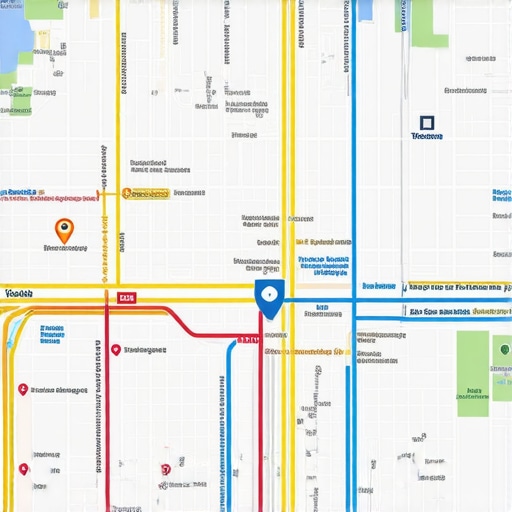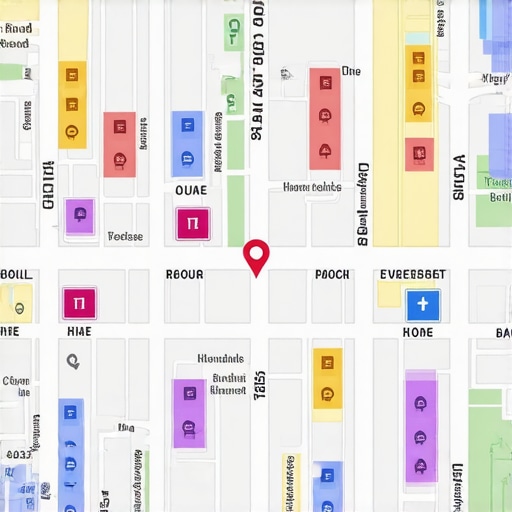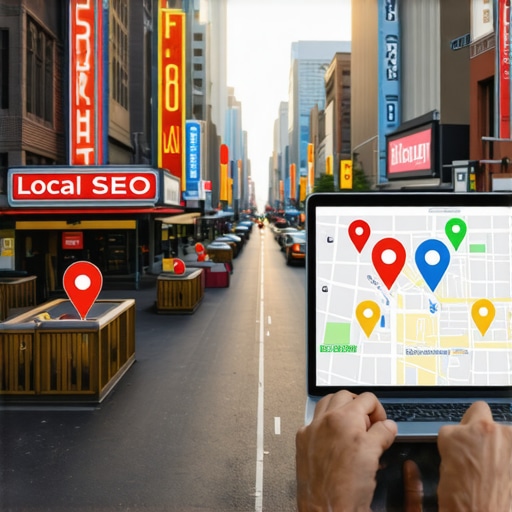Deciphering the Complexities of GMB Citations to Elevate Your Local SEO in 2025
In the competitive landscape of local search, Google My Business (GMB) citations serve as a foundational pillar for establishing authority and trustworthiness. As search engine algorithms evolve, understanding the nuanced role of citations—especially in relation to emerging ranking signals—becomes imperative for SEO professionals aiming to outperform competitors in the 2025 local ecosystem.
Why Citations Remain a Critical Component in Advanced Local SEO Tactics
While backlink profiles and on-page optimization are well-known ranking factors, citations—structured mentions of business details across the web—create a web of trust that Google leverages to verify local relevance. The strategic consistency, accuracy, and diversity of citations directly influence a business’s visibility in the coveted Google 3-Pack. According to Moz’s Local Ranking Factors study, citations account for approximately 15% of local pack rankings, underscoring their significance even amidst algorithmic complexity.
How to Leverage Niche-Specific Citation Sources for Competitive Advantage
Beyond standard directories, industry-specific citation sources offer a pathway to niche relevance and higher authority signals. For instance, service-based businesses should explore citations on specialized platforms such as local industry directories that cater to their vertical. Implementing a layered citation-building strategy that encompasses both broad and niche platforms enhances local relevance and diminishes the impact of citation stagnation or inconsistency.
What Are the Emerging Challenges and How to Overcome Them?
In the face of increasing citation spam and NAP inconsistencies, how can businesses ensure the integrity of their citation profile?
Maintaining citation accuracy is more critical than ever. Employing automated tools like BrightLocal can help monitor citation consistency across platforms, flag discrepancies, and facilitate prompt updates. Additionally, deploying structured data markup on your website ensures that Google accurately interprets your business information, reinforcing citation authority and reducing the risk of misinformation.
Why is Citation Diversity Key to Outrank Local Rivals?
Achieving citation diversity involves securing mentions across various authoritative domains, from industry-specific directories to local news outlets. This multi-channel approach signals robust local relevance and mitigates over-reliance on a handful of sources, which can be risky if those sources lose credibility or become outdated.
Explore Further: How Can You Integrate Citations with Your Broader GMB Optimization Strategy?
Integrating citations with comprehensive GMB optimization—including review management, content updates, and profile completeness—creates a synergistic effect that amplifies local rankings. For in-depth strategies, consult expert citation services that tailor citation-building efforts to your niche and location.
As the local SEO landscape becomes increasingly sophisticated, continuous monitoring, diversification, and strategic alignment of citations will distinguish top performers. For a tailored approach, consider conducting a comprehensive GMB audit to identify citation gaps and opportunities.
Stay ahead by embracing these expert insights, and share your own successes or challenges in citation management to foster a community of innovative local SEO practitioners.
How Can Hyperlocal Citation Strategies Transform Your Local SEO Outcomes?
In the rapidly evolving landscape of local search, hyperlocal citation strategies are emerging as game-changers for businesses aiming to outrank competitors. By focusing on ultra-specific, community-driven platforms—such as neighborhood directories, local event listings, and regional blogs—businesses can establish a presence that resonates deeply with their immediate audience. This targeted approach not only enhances relevance signals but also builds a robust local reputation that Google’s algorithm increasingly prioritizes. For actionable tactics, explore understanding local SEO for small businesses.
What Are the Limitations of Traditional Citation Building, and How Can You Overcome Them?
Traditional citation building often relies heavily on broad directories, which can lead to saturation and diminishing returns. Moreover, inconsistent NAP (Name, Address, Phone Number) data across platforms can dilute local relevance and harm rankings. To address these issues, advanced SEO practitioners are adopting dynamic citation management tools that monitor citation health in real-time, such as BrightLocal, and integrating structured data markup to ensure data consistency. These methods help maintain citation integrity and prevent the pitfalls of duplicate or outdated mentions.
Integrating Citation and Content Strategies for a Cohesive Local SEO Ecosystem
Effective local SEO in 2025 hinges on a seamless blend of citation authority and content relevance. By creating localized content—such as neighborhood guides, customer success stories, or event announcements—and amplifying these through targeted citations, businesses can forge a powerful, interconnected digital presence. This synergy boosts both local relevance and user engagement. To deepen your understanding, consider reviewing our comprehensive local SEO optimization techniques.
Can AI-driven Citation Analysis Offer a Competitive Edge?
Absolutely. Leveraging AI-powered tools for citation analysis allows businesses to identify high-impact citation sources, detect inconsistencies, and predict emerging local trends. These insights enable proactive citation management and strategic adjustments, ensuring your business stays ahead of local competitors. For instance, AI can help identify niche citation opportunities that manual research might overlook, significantly enhancing your citation diversification efforts. For more on this, see advanced GMB SEO techniques.
To stay ahead in local search dominance, consider enrolling in specialized citation management training or utilizing advanced analytics platforms. Share your experiences or questions in the comments—your insights can help shape the community’s collective knowledge and success in local SEO.
Harnessing Hyperlocal Citations for Unmatched Local SEO Authority
In the quest for local search supremacy, hyperlocal citations are an often-overlooked goldmine. These ultra-specific mentions—found on neighborhood blogs, community bulletin boards, or regional event listings—craft a granular relevance signal that Google’s algorithm increasingly values. Unlike broad directory citations, hyperlocal mentions embed your business into the fabric of the community, fostering trust and recognition at a visceral level.
Implementing a hyperlocal citation strategy involves meticulous research. Identify niche platforms or regional online hubs where your target audience actively participates. For example, a boutique coffee shop might seek mentions on local farmers’ markets websites, neighborhood Facebook groups, or regional lifestyle blogs. These sources reinforce your local presence and help differentiate your business amidst a crowded marketplace.
Pro tip: Use tools like BrightLocal or Whitespark to map out hyperlocal citation opportunities, ensuring no relevant community platform goes unnoticed. Consistency in name, address, and phone number (NAP) across these sources maintains citation integrity and maximizes local relevance.

Suggested Image Prompt: A vibrant neighborhood map highlighting local community platforms and directories for hyperlocal citations, emphasizing community engagement and local relevance.
Addressing Complex Challenges: The Future of Citation Management in a Dynamic Local SEO Ecosystem
How can businesses adapt their citation strategies to counteract the increasing sophistication of spam and misinformation?
As citation spam and NAP inconsistencies proliferate, especially on user-generated content sites, proactive management becomes paramount. Advanced businesses leverage AI-driven tools such as SEMrush or Moz Local to monitor citation health and flag discrepancies in real-time. These platforms can automatically detect duplicate entries, outdated information, and suspicious spammy citations, allowing swift corrective action.
Moreover, integrating structured data markup—specifically Schema.org Business markup—on your website ensures that Google receives a consistent, authoritative data feed, reducing reliance on external citations alone. This hybrid approach, combining automated monitoring with authoritative data signals, fortifies your local SEO foundation against misinformation and citation dilution.
Furthermore, establishing direct relationships with authoritative local entities—such as chambers of commerce or regional industry associations—can serve as a trusted source of verified citations. These partnerships not only boost citation credibility but also foster community trust.
Suggested Image Prompt: A professional SEO analyst reviewing citation data dashboards on a dual-monitor setup, with graphs displaying citation health and discrepancies highlighted.
Integrating Citation Strategies with Broader Local SEO Initiatives for Holistic Success
Effective local SEO transcends mere citations. It requires a harmonized approach that integrates citations with content marketing, review management, and GMB profile optimization. For instance, creating localized blog content—such as neighborhood guides or customer success stories—can be paired with targeted citations on relevant industry and community platforms, amplifying both relevance signals and engagement.
Additionally, actively managing reviews and responding promptly enhances your business’s reputation, which in turn influences local ranking factors. Synchronizing review signals with citation data creates a cohesive narrative of trustworthiness and community engagement.
To achieve this, consider deploying a comprehensive local SEO platform like BrightLocal’s suite, which enables seamless management of citations, reviews, and local content campaigns from a centralized dashboard. This integrated approach ensures that your local SEO efforts are not siloed but work synergistically for maximum impact.
How does AI-powered citation analysis redefine strategic decision-making in local SEO?
AI-driven analysis offers predictive insights—identifying emerging citation opportunities before competitors do, and pinpointing potential citation vulnerabilities. By analyzing patterns across thousands of local mentions, AI can recommend targeted outreach efforts, suggest optimal citation sources, and forecast the impact of citation diversification strategies.
For example, a retail chain expanding into new neighborhoods can use AI tools to identify community-specific platforms gaining traction, ensuring their citations stay ahead of local trends. Such foresight transforms citation management from reactive to proactive, cementing your place at the top of local search results.
Engage with these advanced techniques by exploring platforms like BrightLocal’s Citation Tracker or Whitespark’s Citation Finder, and consider investing in specialized training to master AI-powered local SEO analytics. Your deepened understanding will position your business as a local SEO leader in 2025 and beyond.
Unlocking the Power of Hyperlocal Citations for Unrivaled Local SEO Dominance
As the local search landscape continues to evolve, hyperlocal citations emerge as a critical component for businesses seeking to enhance their visibility within tightly-knit communities. These ultra-specific mentions—found on neighborhood blogs, regional event listings, and community boards—serve as powerful relevance signals that Google’s algorithm increasingly prioritizes, especially in 2025. By embedding your business into the local fabric through targeted hyperlocal citations, you create a robust ecosystem of trust and recognition that transcends generic directory listings.
Why Hyperlocal Citations Outperform Traditional Strategies in Niche Markets
Traditional citation building often relies heavily on broad directories like Yelp or Yellow Pages, which, while valuable, may lead to saturation and diminishing returns. Hyperlocal citations, however, focus on community-specific platforms—such as local Facebook groups, neighborhood association websites, or regional lifestyle blogs—that foster authentic engagement. This granular approach not only elevates your local relevance but also nurtures community trust, which is increasingly influential in local ranking algorithms.
How to Identify and Leverage High-Impact Hyperlocal Platforms
To harness hyperlocal citation potential, meticulous research is essential. Start by mapping out community hubs—think of regional online forums, local event calendars, and neighborhood newsletters—and evaluate their authority and relevance. Tools like Whitespark’s citation opportunity finder or BrightLocal’s hyperlocal modules can streamline this process, ensuring no valuable platform is overlooked. Establishing consistent NAP data across these sources fortifies your local relevance and prevents diluted signals caused by inconsistent information.
What Are the Key Metrics to Measure Success in Hyperlocal Citation Campaigns?
In-depth analysis of hyperlocal citation effectiveness involves tracking metrics such as citation acquisition rate, NAP consistency scores, local pack rankings, and referral traffic from community platforms. Utilizing advanced analytics platforms like SEMrush or Ahrefs, integrated with local SEO tools, enables a comprehensive assessment of your hyperlocal footprint’s impact on overall visibility and lead generation. Regularly refining your strategy based on these insights ensures sustained growth and competitive edge.
For an authoritative perspective on hyperlocal SEO, refer to Moz’s guide on hyperlocal SEO best practices, which emphasizes community engagement and data accuracy as pivotal elements.
Engage with these sophisticated tactics to elevate your local presence—your proactive approach in hyperlocal citation management can transform community engagement into tangible business growth.

Suggested Image Prompt: A detailed neighborhood map highlighting local community platforms, blogs, and event listings for hyperlocal citation opportunities, emphasizing community integration and relevance.
Expert Insights & Advanced Considerations
1. Citation Consistency as a Trust Signal
Maintaining uniform NAP (Name, Address, Phone Number) data across all platforms is crucial. Any discrepancy can undermine local relevance and trustworthiness, impacting rankings significantly. Implement automated monitoring tools to ensure data accuracy at scale.
2. Hyperlocal Citations as Niche Authority
Focusing on community-specific platforms like neighborhood blogs and regional directories enhances local relevance. These hyperlocal mentions embed your business into the community fabric, boosting trust signals that Google prioritizes in 2025.
3. AI-Driven Citation Optimization
Leveraging AI tools to analyze citation impact and identify high-value sources enables proactive strategy adjustments. Predictive analytics help in capturing emerging local trends before competitors, securing a competitive edge.
4. Structured Data Markup for Citation Integrity
Implementing Schema.org markup on your website ensures consistent data dissemination, reducing dependency on external citations and safeguarding against misinformation. This hybrid approach solidifies your local SEO foundation.
5. Diversification of Citation Portfolio
Beyond directories, securing mentions on local news outlets, industry forums, and social platforms creates a diverse backlink ecosystem. This mitigates risks associated with over-reliance on a few sources and signals broader local authority.
Curated Expert Resources
- Moz Local: Industry-standard platform for citation health monitoring and management, offering comprehensive insights into local data consistency.
- BrightLocal: Advanced tools for citation tracking, audit, and review management, ideal for maintaining citation integrity in dynamic environments.
- Whitespark: Citation discovery and backlink analysis tool with a focus on hyperlocal opportunities, perfect for niche targeting.
- Schema.org: The authoritative source for implementing structured data markup to enhance data accuracy and richness.
- Google’s Local Search Quality Guidelines: Official documentation outlining best practices for citation accuracy and local relevance signals.
Final Expert Perspective
In 2025, mastering Google My Business citations requires a sophisticated blend of consistency, hyperlocal focus, and emerging AI technologies. Strategic diversification and authoritative data management elevate your local SEO authority, positioning your business to outrank competitors effectively. Dive deep into these expert insights and leverage curated tools to refine your approach. Your proactive stance on citation excellence is essential for sustained visibility and growth—engage with advanced resources and share your experiences to shape the future of local search dominance.
,

